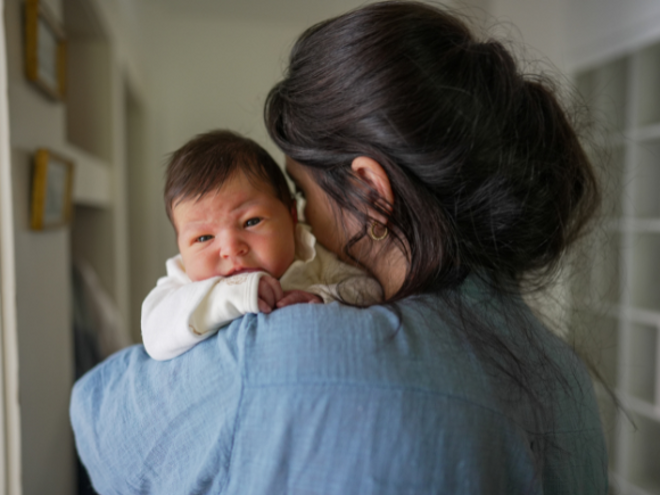
Constipation in Newborns
There is likely to be slight differences in poo between babies depending on their age and what food or milk is being consumed. While infrequent bowel motions may be an indication of baby constipation, it is not always the case in infants.
While you might have a fair idea of what constipation in adults is, it is important to be aware that the definition is slightly different for our little ones. Normally, your child will effortlessly pass a poo without concern or discomfort. However, as every child is different it’s important to understand your baby’s habits and if you think your baby is constipated, talk to your health care professional for tailored advice. Read more about normal baby poo here.
What is baby constipation?
Constipation in infants is more frequently defined as passing hard, dry (like small pellets) poo. You may also notice they aren’t going very frequently or regularly. If your baby is constipated, they may go red, grunt or cry during pooing. However it may also be quite normal for young babies to show these symptoms without it being constipation, as they may just be getting used to pooing and usually grow out of this. It’s important to know that there is quite a wide range of ‘normal’ when it comes to bowel motions in kids.
Constipation is very common in young children, and quite often occurs when there is a change in milk type, or diet. For example infant constipation may occur when first introducing solid food, or changing from breast milk to an infant formula. If your baby is fed infant formula, generally poo is thicker and pastier and sometimes less frequent than breast-fed poo, but this doesn’t necessarily mean your baby has constipation.
Possible causes of constipation in babies
After seeing signs of constipation in your infant, you will naturally look to what could possibly be causing it. Check out some possible causes below:
- Not enough fluid intake over the day. This may be due to illness, not enough feeds over the day, or hot weather causing fluid loss through sweat.
- Incorrect infant formula preparation may cause infant constipation. Incorrect ratios of powder and water may affect bowel habits.
- Changes to their daily routine may impact on your baby’s eating patterns and fluid intake and in turn will affect their bowel habits. This may be due to changes in appetite or simply the logistics of fitting everything into a new routine.
- Introducing solids or changing formulas (such as moving to a follow-on formula) may lead to bowel changes and baby constipation. This does not happen in every case but is quite normal and can take some babies longer to adjust.
- As your infant becomes more aware of their bowel movements you may find their toilet habits change.
What are the signs of constipation in infants?
Constipation in babies can present differently depending on their age and individual circumstances. Parents should be vigilant in observing their baby's behaviour and physical signs, as constipation can lead to discomfort and other health issues if not addressed. There are a few signs of constipation in infants to recognise:
- Straining during bowel movements. Babies may appear to be in pain or discomfort while trying to pass stool, often showing signs of straining or grunting.
- Hard, dry stools. The stool may be small, hard, and pebble-like, which can be painful for your little one to pass.
- Reduced frequency of bowel movements. While there is variation between babies, newborns typically have several bowel movements daily, while older infants may have fewer. A significant decrease in frequency (e.g., fewer than three times a week) can indicate constipation
- Fussiness or unsettled behaviour. Babies may seem more irritable or fussy than usual, especially during feeding or when trying to pass a stool.
- Decreased appetite. Eating less or refusing to eat altogether could be a sign of constipation in infants, due to discomfort.
- Abdominal discomfort or bloating. Parents may notice their baby’s abdomen appearing swollen or feeling firm to the touch, indicating gas or constipation.
You may notice other signs of constipation in older infants including avoiding or delaying having a bowel movement and strange faces as if they are in pain each time they pass a poop.
How to relieve constipation in newborns
- Ensure adequate fluid intake over the day, this could be in the form of extra breastfeeds or for older infants offering cool boiled water to drink between feeds, particularly in hot weather.
- When your baby starts solids, they may need extra fluid, through extra breastfeeds or offering cooled boiled water to drink between meals.
- If your baby is on infant formula, ensure you are making the formula according to the directions on pack. Always use the scoop provided in the tin you are using.
- If there are any major changes to your baby’s normal routine, take extra notice of their appetite, extra cuddles and one-on-one play time may be needed to help them feel more settled in their new routine, which will help their appetite return.
- For infants over 6 months of age constipation can be reduced by increasing fibre through adding fruit and vegetables into their diet.
- Gentle massage strokes below your baby’s belly button in a clockwise direction.
- Give your baby plenty of opportunities for tummy time, extra mobility will help get the bowels moving too.
- Do bicycle leg movements at nappy change time. This may be particularly helpful for very young babies who have limited mobility.
- Treatment from a specialised healthcare professional may be able to help regulate bowel movements.
- Before any form of medication is used, diet/feeding practices and exercise/movement are the primary areas to consider to help manage infant constipation. Always consult a medical professional before using any digestive aids (e.g. Oral laxatives or suppositories) with your baby.
When working out how to relieve constipation in your newborn, chat to other mums, support forums online or for tailored advice talk to your healthcare professional.
When to see a doctor if your baby is constipated?
Occasional constipation in babies can be normal but recognising the symptoms and signs of constipation in infants early can help you manage the situation effectively. If any of these symptoms persist or worsen, it’s time to talk to your healthcare professional for tailored guidance and support.
Often simple and effective treatments will get your baby’s bowel movements running like clockwork again in no time. Bear in mind that some babies (and adults, for that matter) are naturally more susceptible to constipation than others.
If your baby’s constipation is accompanied by any of the following symptoms, seek medical advice. Early intervention is always the best:
- Your baby’s stool contains blood. It is crucial to seek medical attention immediately, as this can indicate a more serious issue.
- Your baby is in pain or severe discomfort when passing a stool;
- Your baby is irritable throughout the day;
- Your baby’s sleep is being affected;
- Your baby has abdominal pain or bloating.
Frequently asked questions about baby constipation
What do you do when a baby is constipated?
If your baby is constipated, try offering more fluids, such as extra breastfeeds, or extra water if they are older. Gentle tummy massages and bicycle leg movements can also help. If constipation persists, consult your healthcare professional for advice and potential dietary adjustments tailored to your baby's needs. Don’t use any over the counter medication or laxatives without medical guidance.
How long is it OK for a baby to be constipated?
It is generally considered normal for a baby to have infrequent bowel movements, but if your baby has not had a bowel movement for more than three days, it may indicate infant constipation. If you notice signs of discomfort, straining, or hard stools, consult your healthcare professional for personalised guidance and support.
How to encourage newborns to poop?
To encourage newborns to poop, you can try various methods, including tummy time; gentle leg movements like bicycle legs; a warm bath to relax your baby’s muscles; gentle massage of your baby's tummy in a circular motion to promote digestion; and ensuring they are well hydrated. If your little one continues to have difficulty with bowel movements, it may be constipation and it’s important to talk to your healthcare professional. They will be able to tailor information on how to relieve constipation in newborns to your baby, early intervention is key.
Why is my baby passing gas but not pooping?
Passing gas is a normal part of digestion and can occur without passing a stool. If your baby is passing gas or wind but not pooping, it may be due to constipation as it causes gas buildup without a bowel movement. However it may also be due to other reasons such as irregular bowel movements (as their digestive systems are still developing); dietary factors (if your baby is breastfed, formula fed, or starting solid food); or dehydration (insufficient fluid intake can lead to harder stools). If your baby seems uncomfortable or has not had a bowel movement for more than a few days, it's advisable to consult your doctor for evaluation and guidance.
What to do if baby's poop is hard and stuck?
If your baby's poop is hard and stuck you can try gently massaging their tummy and offering a warm bath to relax their muscles. Moving their legs in a bicycle motion can also help stimulate bowel movements. Ensure your baby is well-hydrated, and consult your doctor if the issue persists or if your baby appears agitated or in pain. Avoid using over-the-counter laxatives without medical recommendation.
Sources:
Pregnancy, Birth and Baby Website. Accessed at https://www.pregnancybirthbaby.org.au/constipation-in-babies
Raising Children Website. Accessed at https://raisingchildren.net.au/babies/health-daily-care/poos-wees-nappies/constipation
Health Direct Website. Accessed at https://www.healthdirect.gov.au/constipation-in-children


